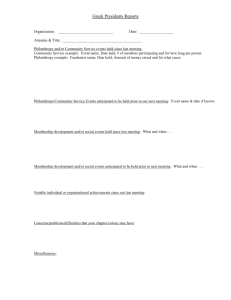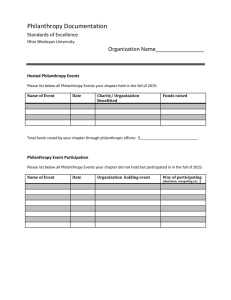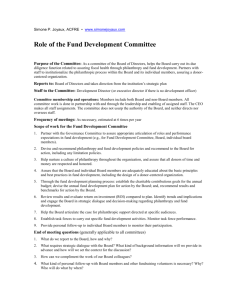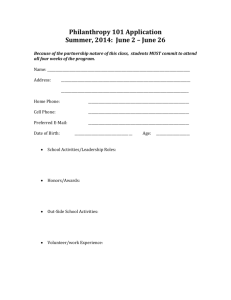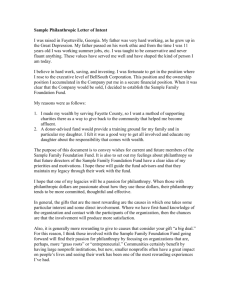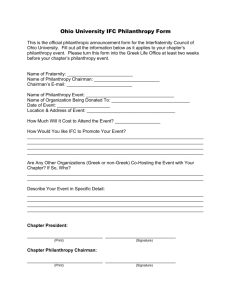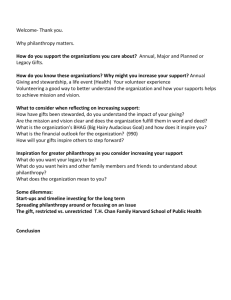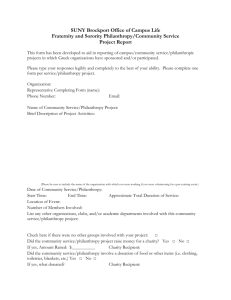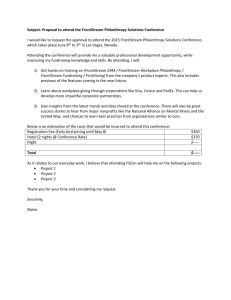Week One August 28th Intro
advertisement
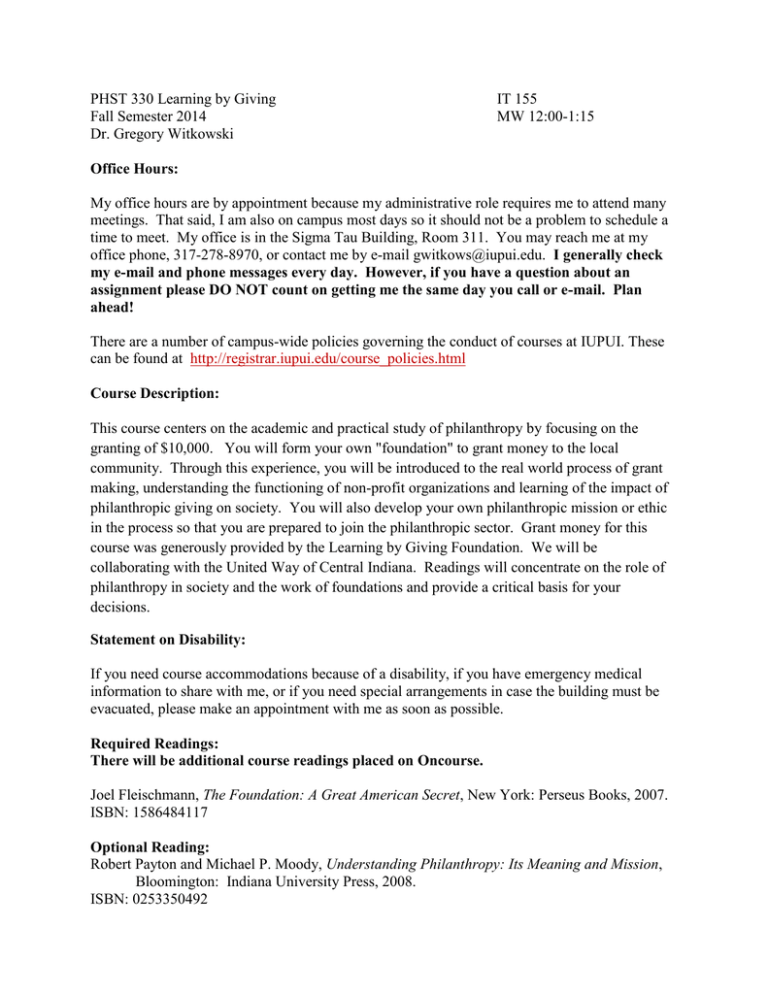
PHST 330 Learning by Giving Fall Semester 2014 Dr. Gregory Witkowski IT 155 MW 12:00-1:15 Office Hours: My office hours are by appointment because my administrative role requires me to attend many meetings. That said, I am also on campus most days so it should not be a problem to schedule a time to meet. My office is in the Sigma Tau Building, Room 311. You may reach me at my office phone, 317-278-8970, or contact me by e-mail gwitkows@iupui.edu. I generally check my e-mail and phone messages every day. However, if you have a question about an assignment please DO NOT count on getting me the same day you call or e-mail. Plan ahead! There are a number of campus-wide policies governing the conduct of courses at IUPUI. These can be found at http://registrar.iupui.edu/course_policies.html Course Description: This course centers on the academic and practical study of philanthropy by focusing on the granting of $10,000. You will form your own "foundation" to grant money to the local community. Through this experience, you will be introduced to the real world process of grant making, understanding the functioning of non-profit organizations and learning of the impact of philanthropic giving on society. You will also develop your own philanthropic mission or ethic in the process so that you are prepared to join the philanthropic sector. Grant money for this course was generously provided by the Learning by Giving Foundation. We will be collaborating with the United Way of Central Indiana. Readings will concentrate on the role of philanthropy in society and the work of foundations and provide a critical basis for your decisions. Statement on Disability: If you need course accommodations because of a disability, if you have emergency medical information to share with me, or if you need special arrangements in case the building must be evacuated, please make an appointment with me as soon as possible. Required Readings: There will be additional course readings placed on Oncourse. Joel Fleischmann, The Foundation: A Great American Secret, New York: Perseus Books, 2007. ISBN: 1586484117 Optional Reading: Robert Payton and Michael P. Moody, Understanding Philanthropy: Its Meaning and Mission, Bloomington: Indiana University Press, 2008. ISBN: 0253350492 Grading Policy: Attendance is mandatory. Because we are working together to grant the money, it is essential that all participate in the process as much as possible. Missing more than three sessions will lead to me dropping your semester grade by a half grade (B becomes B-) for each additional session you miss. The breakdown of the grades is as follows. Class Participation 10% Research Paper/Presentation 15% Exam 15% Class Project 50% Report/Presentation for granting process (e.g. Site Visits) 15% Analysis of grant applications 35% Reflections 10% Class participation: I encourage all of you to ask questions and participate in class discussions. You should read the assignments and be prepared to discuss the themes listed for each week. I expect the class to be almost exclusively discussion based. Asking good questions during the granting process is essential to making good granting decisions. Research Paper: This paper requires you to research need in the community, non-profits addressing that need and to present about these needs to the class. Because there are few books to turn to on current need in Indianapolis, much of your research will involve newspapers and websites about Indianapolis and the community. The paper will be 5-8 pages in length, define the need and examine non-profits that are working on improving the situation. Depending on the number of students each person will present individually or in a group by sector. Your paper will be your own. Exam: An exam will test factual knowledge about the readings and your ability to use that knowledge to interpret the causality and significance of developments in philanthropy. It will include short answer and an essay. You will receive a study guide before the exam. Class Project: This assignment includes granting funds to a local agency or agencies. These funds have been provided by the Learning by Foundation. We will examine our values and local needs before writing a mission statement for a foundation. This statement will include the guiding principles and goals the class wants to pursue in their charitable giving and will be used to formulate the request for proposals. Among the decisions we will make is what issues to target and what to fund, e.g. special projects, operating expenses, endowment. Each grant will be evaluated and finalists will be visited to determine the NPO to receive the grant. Because the granting agencies must be given time to respond to the request, we need to complete a number of tasks early in the semester. Please be prepared to dive right in. Reflection Paper: The specific reflections are 2 page assignments on aspects of the course. You should describe what happened, evaluate an important aspect of the process, and analyze what you have learned. These are to be placed on Oncourse on day they are due. They will not be graded but need to be posted. At the end of the course, I will ask you to reflect on the entire course. This paper will be about 10 pages in length and ask you to think about the whole course in addition to the specific aspects. You may use material from your specific reflections in your final paper. This will account for the grade. Honors Contract The Honors component will require the development of leadership skills through numerous course assignments. Honors students will be asked to synthesize the reports on local needs to help the class highlight different components of need and how they can have an impact. Honors students will also serve as mediators between the course and the community. They will organize the discussion of local needs, lead presentations in course and organize the site visits. They will be program officers, who will answer e-mails from prospective applicants about the request for proposal. Grantwriters often ask about the goals of the fund and these students can provide that feedback to them. Finally, honors students will write a 15 page philanthropic autobiography, which traces not only what they learned in class but how this course has changed their view of philanthropy. Grading Scale: A+ A AB+ 97-100% 93-96% 90-92% 87-89% B BC+ C 83-86% 80-82% 77-79% 73-76% CD+ D D- 70-72% 67-69% 63-66% 60-62% Academic Integrity: This course is to help you learn to formulate and express your own ideas; it therefore goes without saying that all work you turn in should be your own. We will discuss correct ways in which you may incorporate other people’s ideas into your writing. However, knowingly passing off someone else’s words as your own is a violation of Indiana University’s Code of Student Rights, Responsibilities, and Conduct. Depending on the nature of the offense, the penalty for plagiarism may include receiving an F on a paper or assignment, failing this course and being referred to the Dean, or being expelled from the university. The Code may be found at http://www.iu.edu/~code/ Principles of Undergraduate Learning: IUPUI has developed a set of expectations for the undergraduate educational experience called the Principles of Undergraduate Learning (PULs). Each course contributes in unique ways to this campus goal for student learning. To a certain extent, the curriculum, readings, activities, and structure of PHST330 will support many of the PULs. However, PUL 3 Integration and Application of Knowledge receives a major emphasis in PHST330. In PHST330, your instructors will assess your mastery of Integration and Application of Knowledge by identifying the following in your work and class participation: Ability to articulate personal values and how higher education and experience has enhanced their personal lives Ability to meet professional standards and competencies related to philanthropic endeavors Ability to articulate knowledge, skills, and dispositions to advance personal and professional goals as well as the goals of society Ability to analyze information and work across traditional course and disciplinary boundaries Ability to read, analyze, synthesize, evaluate and critically reflect upon course readings and assignments. Ability to ask insightful questions through disciplined thinking. Ability to find and make use of quality information and data to support positions and inspire ideas. Assignments: The following is a tentative schedule of assignments. These may be changed if necessary, especially to accommodate the granting process. You will need to do site visits off campus and to attend the award ceremony. The readings will stay as listed so please complete them for the class date listed. Week 1 Grantmaking and Need 8/25 Introduction 8/27 Complete the Survey. Read Robert Payton and Patricia Dean “Philanthropy” in Encyclopedia of Indianapolis and Kirsten Groenjberg Indiana Nonprofits Survey (Oncourse). Choose research topics. Week 2 Philanthropy in Indianapolis 9/1 Labor Day 9/3 Visit Starfish Week 3 Philanthropy in Indianapolis 9/8 Visit La Plaza 9/10 Christie Gillespie, United Way (in class) Week 4 Philanthropy and Values 9/15 Discussion of the meaning of philanthropy. Read Richard Gunderman We Make a Life by What We Give Chapter 1 (Oncourse). 9/17 Read mission statements from Learning by Giving Foundation, Bill and Melinda Gates Foundation, and your favorite non-profit organization. 9/19 Research Paper on Need Due Week 5 Local Need 9/22 Presentations 9/24 Presentations Week 6 Forming our Foundation 9/29 Read Fleischman, Chapters 1-4 10/1 Read Barbara Kibbe, et. al. “Panning for Gold” in Grantmaking Basics, A Field Guide for Funders (Oncourse) and previous year’s RFP. Make revision to RFP and post on Oncourse Week 7 Writing the RFP 10/6 Read Fleischman Chapters 5-6 10/8 Read Fleischman Chapters 7-8 Week 8 Foundations in Society 10/13 Read Fleischman Chapters 9-11 10/15 Read Fleischman, chapters 12-Epilogue Week 9 Fall Break 10/20 Fall Break 10/22 Review Week 10 Tools for Evaluation 10/27 Exam 10/29 Read “Numbers and Sense” from Grantmaking Basics, A Field Guide for Funders (Oncourse), “Site Visits Kibbe” from Grantmaking Basics, A Field Guide for Funders (Oncourse), pp. 15-35, “Site Visits Boston University”(Oncourse) Week 11 Evaluating Applications 11/3 Read first three grants, write evaluations 11/5 Skim all applications, Write ten evaluations, Discussion of Applications Week 12 Evaluating Applications 11/10 All Grant Evaluations Due 11/12 Grant discussion Week 13 Conducting Site Visits 11/17 Grant discussion 11/19 Site Visits Week 14 Conducting Site Visits 11/24 Site Visits 11/26 Thanksgiving break Week 15 Discussion of Site Visits 12/1 Presentations on site visits. 12/3 Presentations on site visits Week 16 Awarding the Grant 12/8 Decision on Grant (Final Evaluations due) 12/10 Decision on Grant Week 17 Celebrating 12/13 Wrap-up discussion 12/15 Reflection Due 12/17 10:30-12:00 Award Ceremony in Lilly Family School of Philanthropy (TG) first floor conference room. Attendance is required!
